Difference Between Virus and WormWhile discussing the differences between virus and worm, it is important to first understand the larger category of malicious programs, called "Malware". Malware can be defined as a special kind of code or application specifically developed to harm electronic devices or the people using those devices. Viruses and worms are both types of malware; however, there are significant differences between them. 
In this article, we are discussing the significant differences between viruses and worms. Let's first understand both with the definitions: What is a Virus?According to the definition, a Virus is a program developed using malicious codes with a nature that links itself to the executable files and propagate device to device. Viruses are often transferred through the downloaded files and the shared files. They can also be attached with a scripting program and non-executable files like images, documents, etc. However, the virus remains dormant even after arriving on the device with the infected files. After the user executes the infected program, the virus gets activated and starts replicating further on its own. Viruses can harm the system by the following means:
How does a virus spread?The virus does not have the capability of spreading itself. It requires the host and human support to spread. The virus is developed in such a way that it attaches itself to the executable files. It further spreads when the infected executable file or software is transferred from one device to another. As soon as human launches the infected file or a program, the virus starts replicating itself. Typically, the infected program continues to work normally even after the viral infection. However, some viruses can overwrite all the infected program files, destroying the particular program altogether. Besides, the virus attaches itself to new executable files and repeats the entire vicious cycle all over again. This is the reason why the viruses spread at a slower speed. Usually, the viruses are transferred using collaboration apps, email attachments, network share, hard drive, and USB flash drive. What is a Worm?Worms are the type of virus that can self-replicate and travel from device to device using a computer network. That means worms don't need any host to spread. They are standalone computer malware that doesn't even require human support to execute. Usually, worms use computer networks by exploiting vulnerabilities, and that makes them spread more quickly. Besides, worms stay within the memory of an infected computer, making a computer think they are part of the system files. This helps worms to avoid any suspicious detection. Unlike a typical virus, worms don't harm the system data. Instead, they tend to consume system resources like CPU, memory, or network bandwidth and make the entire system or network crash. Because of self-replicating nature, worms can even disrupt systems in a series worldwide using a network. How does a worm spread?Unlike viruses, worms don't require host files to spread. This means that worms do not attach themselves with executable files or programs. Instead, worms find a weak spot in the system and enter through a vulnerability in the network. Before we detect and remove worms from our system, they replicate and spread automatically and consume all the network bandwidth. This can result in the failure of the entire network and web servers. Because worms can spread automatically, their spreading speed is comparatively faster than other malware. Apart from this, worms can also reach other networks that are attached to the infected system. The most dangerous thing is that the worms can send themselves into other systems using email services. Key Differences between Virus and WormFew key differences between Virus and Worm are listed below:
Major Differences between Virus and WormThe other major differences between a virus and a worm can be explained in a tabulated form, as below:
Which is more dangerous?The impact of viruses and worms can be mild to severe. Both are developed to harm the computer and other devices. They can steal and damage the data of individuals, organizations, and government institutions. However, worms seem to look more dangerous because of their self-replicating nature. Also, they can spread faster than viruses. Worms can silently spread into multiple devices by detecting the vulnerability and then inset themselves by exploiting that vulnerability. For instance, let's assume that a worm has attacked us. A worm will infect our emails and transfer itself to all our contacts. It can further replicate itself and spread to all of our contacts' contacts. By doing this, a worm can create an infinite cycle with huge potential damage and harm the resources of all the connected devices or systems. Viruses, on the other side, cannot replicate themselves. They need human-support to start operating, and they are relatively slower at spreading. This makes them less dangerous than worms. How to be safe from viruses and worms?Viruses and worms can cause severe damage to the computer and other devices. It is not enough to only use antivirus software and a firewall system. We are required to follow proper safety guidelines to protect our devices against viruses and worms. Some of the best practices that can be followed to be safe from viruses and worms are given below:
Next TopicDifference between
|
 For Videos Join Our Youtube Channel: Join Now
For Videos Join Our Youtube Channel: Join Now
Feedback
- Send your Feedback to [email protected]
Help Others, Please Share










